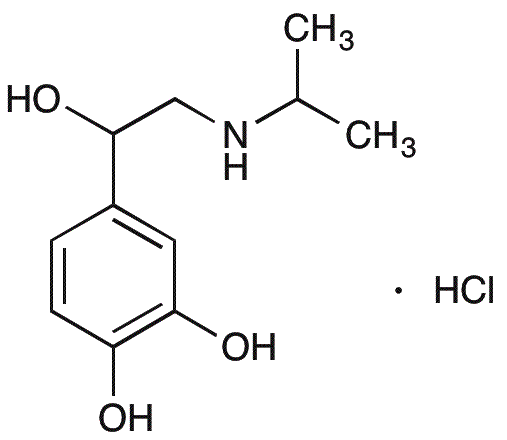Isoprenaline hydrochloride is widely utilized in research focused on:
- Cardiovascular Medicine: This compound is primarily used as a bronchodilator and a cardiac stimulant, making it essential in treating conditions like asthma and bradycardia. Its ability to increase heart rate and improve blood flow is crucial for patients with heart-related issues.
- Pharmaceutical Development: Researchers often use isoprenaline hydrochloride in drug formulation studies to understand its pharmacokinetics and pharmacodynamics, aiding in the development of new cardiovascular and respiratory therapies.
- Clinical Trials: It plays a significant role in clinical trials aimed at evaluating the efficacy of new treatments for heart diseases, providing a benchmark for assessing the performance of new drugs.
- Research on Sympathomimetic Effects: This compound is used in studies examining the sympathomimetic effects on various tissues, helping scientists understand how adrenergic receptors function and their implications in different medical conditions.
- Veterinary Medicine: Isoprenaline hydrochloride is also applied in veterinary practices, particularly in treating respiratory issues in animals, showcasing its versatility beyond human medicine.
General Information
Properties
Safety and Regulations
Applications
Isoprenaline hydrochloride is widely utilized in research focused on:
- Cardiovascular Medicine: This compound is primarily used as a bronchodilator and a cardiac stimulant, making it essential in treating conditions like asthma and bradycardia. Its ability to increase heart rate and improve blood flow is crucial for patients with heart-related issues.
- Pharmaceutical Development: Researchers often use isoprenaline hydrochloride in drug formulation studies to understand its pharmacokinetics and pharmacodynamics, aiding in the development of new cardiovascular and respiratory therapies.
- Clinical Trials: It plays a significant role in clinical trials aimed at evaluating the efficacy of new treatments for heart diseases, providing a benchmark for assessing the performance of new drugs.
- Research on Sympathomimetic Effects: This compound is used in studies examining the sympathomimetic effects on various tissues, helping scientists understand how adrenergic receptors function and their implications in different medical conditions.
- Veterinary Medicine: Isoprenaline hydrochloride is also applied in veterinary practices, particularly in treating respiratory issues in animals, showcasing its versatility beyond human medicine.
Documents
Safety Data Sheets (SDS)
The SDS provides comprehensive safety information on handling, storage, and disposal of the product.
Product Specification (PS)
The PS provides a comprehensive breakdown of the product’s properties, including chemical composition, physical state, purity, and storage requirements. It also details acceptable quality ranges and the product's intended applications.
Certificates of Analysis (COA)
Search for Certificates of Analysis (COA) by entering the products Lot Number. Lot and Batch Numbers can be found on a product’s label following the words ‘Lot’ or ‘Batch’.
Numéro de catalogue
Numéro de lot/série
Certificates Of Origin (COO)
This COO confirms the country where the product was manufactured, and also details the materials and components used in it and whether it is derived from natural, synthetic, or other specific sources. This certificate may be required for customs, trade, and regulatory compliance.
Numéro de catalogue
Numéro de lot/série
Safety Data Sheets (SDS)
The SDS provides comprehensive safety information on handling, storage, and disposal of the product.
DownloadProduct Specification (PS)
The PS provides a comprehensive breakdown of the product’s properties, including chemical composition, physical state, purity, and storage requirements. It also details acceptable quality ranges and the product's intended applications.
DownloadCertificates of Analysis (COA)
Search for Certificates of Analysis (COA) by entering the products Lot Number. Lot and Batch Numbers can be found on a product’s label following the words ‘Lot’ or ‘Batch’.
Numéro de catalogue
Numéro de lot/série
Certificates Of Origin (COO)
This COO confirms the country where the product was manufactured, and also details the materials and components used in it and whether it is derived from natural, synthetic, or other specific sources. This certificate may be required for customs, trade, and regulatory compliance.


